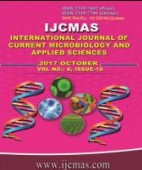


 National Academy of Agricultural Sciences (NAAS)
National Academy of Agricultural Sciences (NAAS)

|
PRINT ISSN : 2319-7692
Online ISSN : 2319-7706 Issues : 12 per year Publisher : Excellent Publishers Email : editorijcmas@gmail.com / submit@ijcmas.com Editor-in-chief: Dr.M.Prakash Index Copernicus ICV 2018: 95.39 NAAS RATING 2020: 5.38 |
Root-knot nematodes (Meloidogyne spp.) are destructive to tomatoes. Three species of root-knot nematodes, M. incognita, M. javanica and M. hapla are the most widely distributed nematode pathogens of tomato. Root-knot nematodes (Meloidogyne spp.) found to be very fatal infective agents and cause severe yield loses. Emphasis is needed on breeding to develop root knot nematode resistant variety. This study was undertaken to find out the potential source of resistance of tomato under natural epiphytic condition. The experiment was conducted with two cultivars of tomato i.e., AT 3 (susceptible) and SL 120 (resistant) at Department of Biochemistry and Department of Nematology, B.A. College of Agriculture, Anand Agricultural University, Anand. Both tomato cultivars AT 3 (susceptible) and SL 120 (resistant) were grown under control and root knot nematode (3000 J2 stage larvae per plant) inoculated soil and the roots of tomato were analyzed for different phenolic acid compounds during control and disease conditions. The total phenol content was accumulated more in disease condition as compared to control condition. However, significantly the highest total phenol content was recorded for SL 120 (0.36%) under disease conditions. Total twelve phenolic acids were identified and quantified by UPLC under control and disease conditions. Out of which gallic acid, protocatechuic acid, chlorogenic acid, vanillic acid, ferulic acid, sinapic acid and salicylic acid were accumulated in disease conditions as compared to control condition. Salicylic acid was the only phenolic acid found to be increased the most during disease condition as compared to control in resistant cultivar SL 120. The non-significant difference was observed for p-hydroxybenzoic acid in susceptible cultivar AT 3 upon transition from control condition to disease condition and reverse trend was recorded for ellagic acid and caffeic acid in resistant cultivar SL 120.
 |
 |
 |
 |
 |